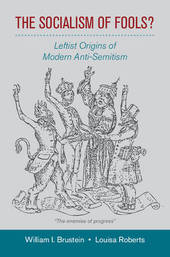
|
The Socialism of Fools?: Leftist Origins of Modern Anti-Semitism
Hardback
Main Details
| Title |
The Socialism of Fools?: Leftist Origins of Modern Anti-Semitism
|
| Authors and Contributors |
By (author) William I. Brustein
|
|
By (author) Louisa Roberts
|
| Physical Properties |
| Format:Hardback | | Pages:217 | | Dimensions(mm): Height 233,Width 157 |
|
| ISBN/Barcode |
9780521870856
|
| Classifications | Dewey:305.8924 |
|---|
| Audience | | Tertiary Education (US: College) | |
|---|
|
Publishing Details |
| Publisher |
Cambridge University Press
|
| Imprint |
Cambridge University Press
|
| Publication Date |
23 July 2015 |
| Publication Country |
United Kingdom
|
Description
Anti-Semitism, as it has existed historically in Europe, is generally thought of as having been a phenomenon of the political right. To the extent that nineteenth- and early twentieth-century leftist movements have been found to manifest anti-Semitism, their involvement has often been suggested to be a mere fleeting and insignificant phenomenon. As such, this study seeks to examine more fully the role that the historic European left has played in developing and espousing anti-Semitic views. The authors draw upon a range of primary and secondary sources, including the analysis of left- and right-wing newspaper reportage, to trace the relationship between the political left and anti-Semitism in France, Germany, and Great Britain from the French Revolution to World War II, ultimately concluding that the relationship between the left and anti-Semitism has been much more profound than previously believed.
Author Biography
William Brustein is Vice Provost for Global Strategies and International Affairs and Professor of Sociology, Political Science and History at Ohio State University. Louisa Roberts is a doctoral candidate in the Department of Sociology at Ohio State University.
Reviews'With a well-documented analysis of anti-Semitic discourse in nineteenth- and twentieth-century political speech, books, pamphlets, manifestos, and right-wing and leftist newspapers, Brustein and Roberts argue that leftist movements contributed to themes and narratives that fueled modern European anti-Semitism. The animosity of the left to Jews stemmed from the conviction that Judaism was anti-modern, Jews were responsible for the evils of capitalism, and Jews were lukewarm nationalists. In France and Germany, these beliefs were not just a minor sideshow to virulent right-wing anti-Semitism but were shared by both adversaries. In the struggle with fascism the socialists did not fully distance themselves from anti-Semitism. In light of this record, the authors raise questions about the contemporary leftist position on Israeli-Palestinian issues. There is much to learn and think about in this well-written book.' Anthony Oberschall, Emeritus Professor of Sociology, University of North Carolina, Chapel Hill
|